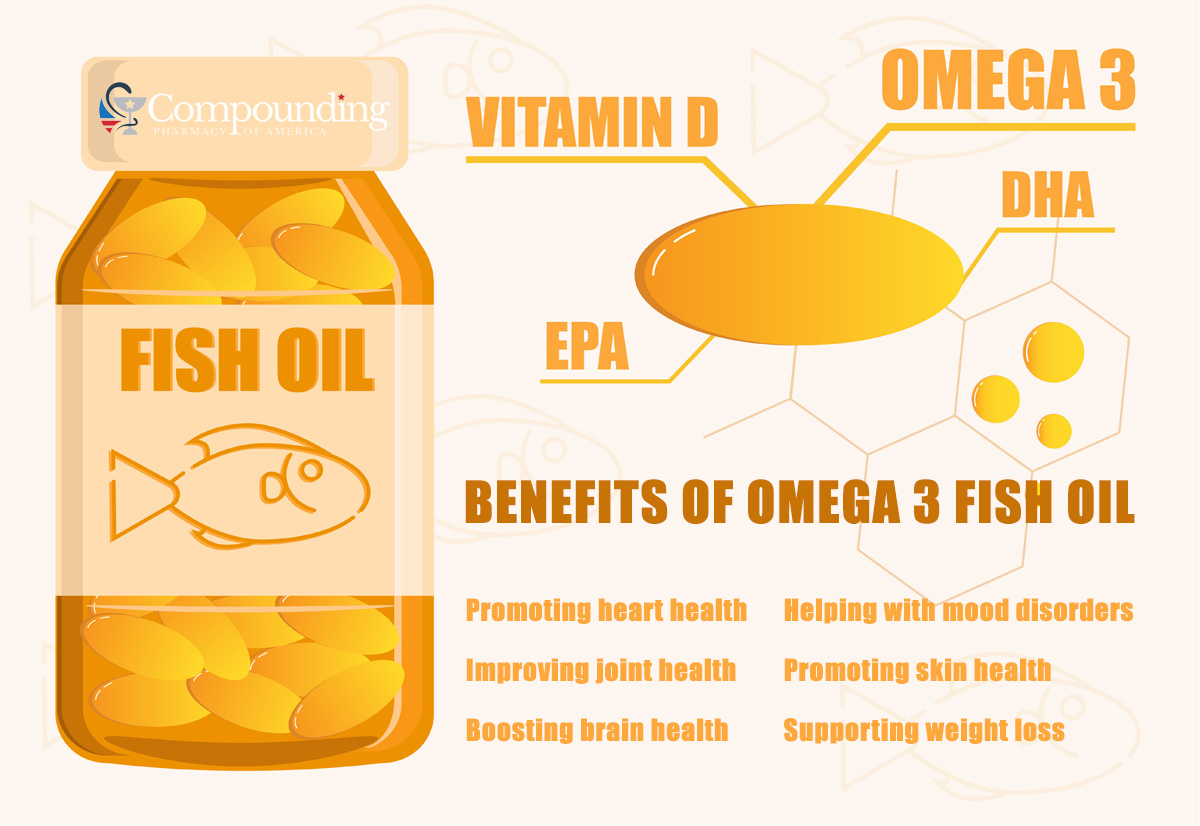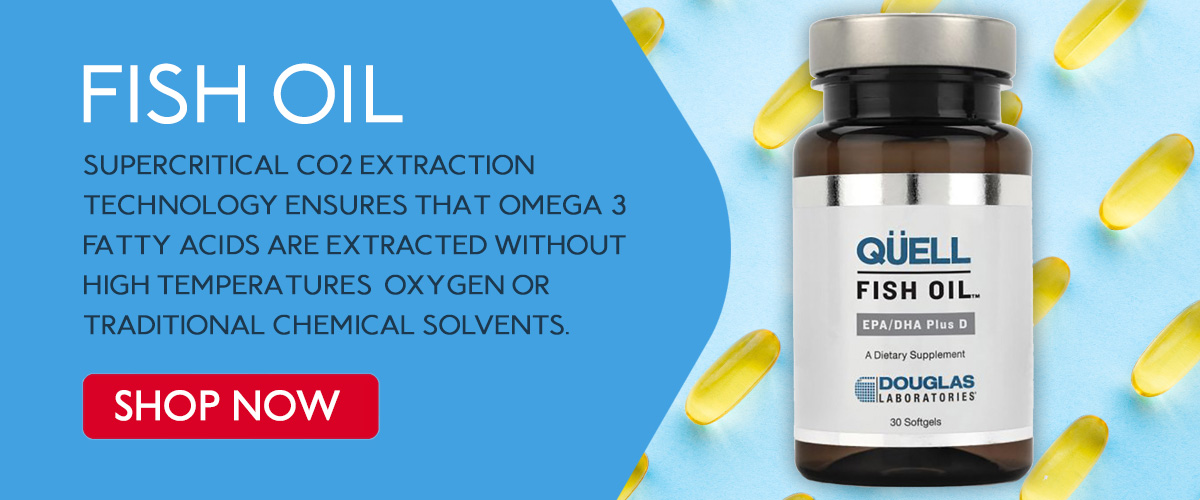
If you’re like most people, one of your primary concerns is how to stay healthy and have more energy. The desire to tackle life’s challenges with vigor and enthusiasm is something we all can connect with. With so many health tips from experts and non-experts alike—and even more products on the market—it’s easy to feel in the dark about what works and what doesn’t.
Omega-3 fish oil is one of the most popular natural supplements today, and many people have begun using it to improve their health. Omega-rich fish oil is full of the fatty acids that make up most of our brain tissue and nerve cells, as well as many other cells in the body. It’s responsible for maintaining cell health, enabling communication between cells, and the overall function of our nervous system. [1]Siegert, E., Paul, F., Rothe, M. et al. (2017) The effect of omega-3 fatty acids on central nervous system remyelination in fat–1 mice. BMC Neurosci 18, 19. … Continue reading You can think of it as the “glue” that helps keep our cells together.
In addition to its crucial role in brain health, omega-rich fish oil has also been shown to be beneficial for heart health, joint health, mood, skin health, and more. Let’s take a closer look at the benefits you can experience from adding more omega-rich fish oil to your diet.
What Is Omega 3 Fish Oil?

Omega-rich fish oil is a fatty acid found in the tissues of oily fish, particularly those found in cold water. It’s also contained in smaller amounts in some plant-based foods. Fish oil is rich in two types of omega fatty acids: EPA and DHA. These fatty acids are important for human health, but our bodies cannot produce them on their own. That’s why it’s important to include them in your diet.
What Are Some Omega 3 Benefits?
There are many health benefits of omega 3-rich fish oil, [2]Gammone, M. A., Riccioni, G., Parrinello, G., & D’Orazio, N. (2018). Omega-3 Polyunsaturated Fatty Acids: Benefits and Endpoints in Sport. Nutrients, 11(1), 46. … Continue reading including:
- Promoting heart health. Omega-rich fish oil has been shown to help lower blood pressure and triglycerides and reduce the risk of heart attack and stroke. [3]Bowen, K. J., Harris, W. S., & Kris-Etherton, P. M. (2016). Omega-3 Fatty Acids and Cardiovascular Disease: Are There Benefits?. Current treatment options in cardiovascular medicine, 18(11), 69. … Continue reading
- Improving joint health. Studies have shown that omega-rich fish oil can help reduce inflammation and pain in joints and improve joint function. [4]Giacobbe, J., Benoiton, B., Zunszain, P., Pariante, C.M., Borsini, A. (2020). The Anti-Inflammatory Role of Omega-3 Polyunsaturated Fatty Acids Metabolites in Pre-Clinical Models of Psychiatric, … Continue reading
- Boosting brain health. As mentioned, omega-rich fish oil has been shown to help improve brain function, memory, and learning.
- Helping with mood disorders. Some studies have shown that omega-rich fish oil can help improve depression and bipolar disorder symptoms. [5]Su, K. P., Matsuoka, Y., & Pae, C. U. (2015). Omega-3 Polyunsaturated Fatty Acids in Prevention of Mood and Anxiety Disorders. Clinical psychopharmacology and neuroscience : The official … Continue reading
- Promoting skin health. Omega-rich fish oil has demonstrated the ability to help improve skin health by reducing the appearance of wrinkles, dryness, and acne. [6]Huang, T. H., Wang, P. W., Yang, S. C., Chou, W. L., & Fang, J. Y. (2018). Cosmetic and Therapeutic Applications of Fish Oil’s Fatty Acids on the Skin. Marine drugs, 16(8), 256. … Continue reading
- Supporting weight loss. Some studies indicate that omega-rich fish oil may help promote weight loss by increasing energy expenditure and reducing appetite. These results were found in individuals who also adopted a lifestyle modification program. [7]de Camargo Talon, L., Prado de Oliveira, E., Moreto, F., Portero-McLellan, K.C., Burini, C. (2015). Omega-3 fatty acids supplementation decreases metabolic syndrome prevalence after lifestyle … Continue reading
As you can see, the benefits of omega-rich fish oil are numerous, and this is just a snapshot of some of the most important. If you’re looking for results in any of the above areas, adding omega-rich fish oil to your diet or supplement regimen could help improve your overall health and well-being.
Why Many Omega-Rich Fish Oil Benefits Involve Reducing Inflammation
The human body is an amazing machine, capable of healing itself from a vast number of ailments with the right tools—and that includes inflammation. So, what, exactly, is inflammation?
In simplest terms, inflammation is the body’s response to injury. Inflammation can be observed in a cut on your finger or a bruise on your arm, and it can also manifest as something more serious like a sprained ankle or broken bone.
When you injure yourself, the body sends white blood cells to the injured area to fight off infection and repair any damaged tissue. While this is happening, you may feel pain or swelling in the injured area. This type of healthy inflammation is your body’s natural response to injury, and it helps protect you from further harm by limiting movement until healing is complete.
However, inflammation can also occur without an injury. This is known as chronic inflammation, and it occurs when the body’s immune system starts attacking its own tissues. Chronic inflammation is responsible for a wide range of diseases and conditions, including heart disease, cancer, Alzheimer’s disease, and arthritis.
What Causes Chronic Inflammation?
There are many factors that contribute to chronic inflammation, including lifestyle choices and genetic predisposition. Some examples of these factors include obesity, smoking cigarettes, poor diet, stress, pollution, and sun exposure. [8]Furman, D., Campisi, J., Verdin, E., Carrera-Bastos, P., Targ, S., Franceschi, C., Ferrucci, L., Gilroy, D. W., Fasano, A., Miller, G. W., Miller, A. H., Mantovani, A., Weyand, C. M., Barzilai, N., … Continue reading
While it’s impossible to avoid all these factors, you can make some simple changes in your life that will help prevent chronic inflammation. Eat a healthy diet, exercise regularly, get enough sleep, and incorporate omega 3 fatty acids into your diet. Omega-rich fish oil is a reliable source of these fatty acids, and it can help reduce inflammation in the body over time. Consistency is key when it comes to reducing inflammation, so make omega-rich fish oil a part of your daily routine to witness its power against unwanted inflammation.
Omega 3 Fish Oil and Mental Health

The struggles of dealing with mood disorders and other mental health conditions can be significant. For many people with mental health concerns, even daily life can be overwhelming.
Fortunately, omega-rich fish oil has also been shown to have a positive impact on mental health, helping those with conditions including:
- Depression
- Anxiety
- ADHD
- Bipolar disorder
- And more
Studies have found that taking omega-rich fish oil supplements can help improve mood, cognitive function, and memory. If you’re struggling with mental health issues, omega-rich fish oil may be a good option for you. Consider adding an omega-rich fish oil supplement to your treatment plan.
Omega 3 Fish Oil and Heart Disease
Heart disease is one of the leading causes of death in America, [9]Ahmad, F.B., Anderson, R.N. (2021). The Leading Causes of Death in the US for 2020. JAMA. 325(18),1829–1830. https://doi.org/10.1001/jama.2021.5469 but it’s also one of the most preventable diseases. Omega-rich fish oil has been shown to reduce the risk of heart disease, and it’s one of the best supplements you can take for your heart health. Omega-rich fish oil can help reduce high blood pressure and cholesterol levels, both of which are risk factors for heart disease.
Omega-rich fish oil can also help prevent plaque buildup in the arteries, which is a major contributor to heart disease. These and other mega-rich fish oil can help keep your heart healthy and functioning properly. If you have heart disease or are at risk for heart disease, omega-rich fish oil may be an ideal supplement for you.
Is Omega Rich Fish Oil Safe?
The safety and efficacy of omega-rich fish oil have been studied extensively in humans, and there is no evidence that it causes adverse side effects in most people. In fact, the only commonly known side effect is a fishy aftertaste, which can be reduced by taking the supplement with meals or in liquid form.
Other rare or minor side effects usually result from taking a large amount of omega-rich fish oil. These potential side effects include:
- Upset stomach. This can occur if you take too much fish oil at once or don’t drink enough water after taking the supplement. Taking omega-rich fish oil with food can also help prevent this side effect.
- Nausea. This is rare and usually only occurs in people who have a sensitive stomach or are taking extremely high doses of fish oil.
- Loose stools. This is also rare and most often occurs when an individual first starts taking omega-rich fish oil. Loose stools usually subside after a few weeks as your body adjusts.
If you experience any adverse side effects while taking omega-rich fish oil, slow your intake or consider consulting with your pharmacist. However, omega-rich fish oil has been shown to be safe for pregnant women, children, and the elderly. It’s also safe for those with chronic conditions such as high blood pressure, diabetes, or high cholesterol.
Should I Take Omega-Rich Fish Oil?

If you’re looking for a safe and effective way to improve your health, omega-rich fish oil may be a good option for you. As mentioned, the benefits are numerous, both for your physical and mental health. After some consideration, for most people, the risk of potential side effects is low compared to the health rewards that the supplement provides.
Omega-rich fish oil is available in multiple formulations, increasing the likelihood that you can find a fish oil supplement to fit your lifestyle:
- Capsules. The most common form of omega-rich fish oil is a capsule that contains liquid inside, usually either cod liver or salmon oil. This form is convenient for people who want to take a supplement on the go or include omega 3s in a pillbox. Capsules typically do not have any fishy taste, which some people find unpleasant.
- Soft gels. These supplements are similar to a capsule, with the outer coating taking a gelatin form. Gel capsules typically digest better than capsules, which can present a benefit for many people.
- Liquid. This is the most absorbable form of omega-rich fish oil and can be taken by mouth or added to food or drinks. It has a mild fishy taste, which some people find unpleasant.
- DHA supplements. This form of omega-rich fish oil is made specifically for children. It contains a higher concentration of DHA than other forms and can be taken by mouth or added to food or drinks.
- Omega-rich fish oil powder. This new form of omega-rich fish oil is a powder that can be mixed with food or drinks or taken in pill form. While many believe fish oil powder is less fishy than liquid, you may still experience some fishy taste.
What Foods Naturally Contain Omega-Rich Fish Oil?
While supplements are a simple route to getting the omega-rich fish oil you need, there are some foods that naturally contain this beneficial oil. Consider combining supplements with an effort to incorporate a few of these natural sources into your diet. In this way, you can ensure you’re reaping maximum benefits.
Omega-rich fish oil can be found in the following foods:
- Salmon
- Tuna
- Mackerel
- Herring
- Sardines
- Cod
- Flaxseed
- Canola oil
- Soybeans
- Walnuts
- Chia seeds
If you’re trying to increase your intake of omega-rich fish oil, it’s best to include some of these foods in your diet. They are all high in protein and healthy fats, which can help improve your overall health and reduce inflammation.
Fish Oil Supplements May Help You
Fish oil is one of the most popular supplements on the market today, and it’s easy to see why. It has many health benefits that have been demonstrated in numerous studies, few—if any—side effects, and is readily available in a safe supplement form. In recent years, enthusiasts have created a tremendous buzz around omega-rich fish oil, but the scientifically proven benefits continue to outshine the hype.
We recommend Quell Fish Oil from our trusted partner, Douglas Labs, to offer our patients the very best fish oil on the market. You can purchase it now, along with other natural supplements, in our online health shop.
*Editor’s Note: This article was originally published December, 2014 and has been updated March, 2022.
Chief Operating Officer, The Compounding Pharmacy of America
Matthew Poteet, Pharm.D. graduated with Honors from Lee University with a Bachelors of Science in Biological Science. After his undergraduate training, he completed the Doctor of Pharmacy program at Mercer University Southern School of Pharmacy, graduating in 2004. Dr. Poteet has spent much of his pharmacy career on staff at two of the most prestigious academic teaching hospitals in the Southeast; Emory University in Atlanta and Vanderbilt University Medical Center in Nashville. At these institutions he received extensive experience and training in sterile products compounding.
He returned home to East Tennessee in 2010, where he has held the position of Pharmacy Director at two sterile products pharmacies in Knoxville. Matthew lives in Knoxville with his wife, Chris. Dr. Poteet is Tennessee’s first Board Certified Anti-Aging Pharmacist by the American Academy of Anti-Aging Medicine.
Sources:
| ↑1 | Siegert, E., Paul, F., Rothe, M. et al. (2017) The effect of omega-3 fatty acids on central nervous system remyelination in fat–1 mice. BMC Neurosci 18, 19. https://doi.org/10.1186/s12868-016-0312-5 |
|---|---|
| ↑2 | Gammone, M. A., Riccioni, G., Parrinello, G., & D’Orazio, N. (2018). Omega-3 Polyunsaturated Fatty Acids: Benefits and Endpoints in Sport. Nutrients, 11(1), 46. https://doi.org/10.3390/nu11010046 |
| ↑3 | Bowen, K. J., Harris, W. S., & Kris-Etherton, P. M. (2016). Omega-3 Fatty Acids and Cardiovascular Disease: Are There Benefits?. Current treatment options in cardiovascular medicine, 18(11), 69. https://doi.org/10.1007/s11936-016-0487-1 |
| ↑4 | Giacobbe, J., Benoiton, B., Zunszain, P., Pariante, C.M., Borsini, A. (2020). The Anti-Inflammatory Role of Omega-3 Polyunsaturated Fatty Acids Metabolites in Pre-Clinical Models of Psychiatric, Neurodegenerative, and Neurological Disorders. Frontiers in Psychiatry, 11. https://doi.org/10.3389/fpsyt.2020.00122 |
| ↑5 | Su, K. P., Matsuoka, Y., & Pae, C. U. (2015). Omega-3 Polyunsaturated Fatty Acids in Prevention of Mood and Anxiety Disorders. Clinical psychopharmacology and neuroscience : The official scientific journal of the Korean College of Neuropsychopharmacology, 13(2), 129–137. https://doi.org/10.9758/cpn.2015.13.2.129 |
| ↑6 | Huang, T. H., Wang, P. W., Yang, S. C., Chou, W. L., & Fang, J. Y. (2018). Cosmetic and Therapeutic Applications of Fish Oil’s Fatty Acids on the Skin. Marine drugs, 16(8), 256. https://doi.org/10.3390/md16080256 |
| ↑7 | de Camargo Talon, L., Prado de Oliveira, E., Moreto, F., Portero-McLellan, K.C., Burini, C. (2015). Omega-3 fatty acids supplementation decreases metabolic syndrome prevalence after lifestyle modification program. Journal of Functional Foods, 19, Part B, 922-928. https://doi.org/10.1016/j.jff.2015.01.022 |
| ↑8 | Furman, D., Campisi, J., Verdin, E., Carrera-Bastos, P., Targ, S., Franceschi, C., Ferrucci, L., Gilroy, D. W., Fasano, A., Miller, G. W., Miller, A. H., Mantovani, A., Weyand, C. M., Barzilai, N., Goronzy, J. J., Rando, T. A., Effros, R. B., Lucia, A., Kleinstreuer, N., & Slavich, G. M. (2019). Chronic inflammation in the etiology of disease across the life span. Nature medicine, 25(12), 1822–1832. https://doi.org/10.1038/s41591-019-0675-0 |
| ↑9 | Ahmad, F.B., Anderson, R.N. (2021). The Leading Causes of Death in the US for 2020. JAMA. 325(18),1829–1830. https://doi.org/10.1001/jama.2021.5469 |

 Subscribe to Our Newsletter
Subscribe to Our Newsletter


